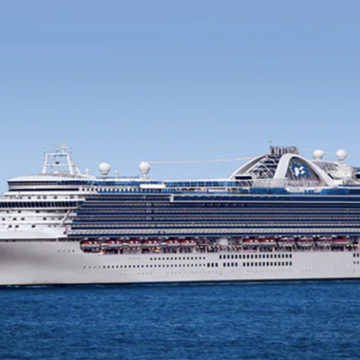
A cruise ship's medical center is purpose-built to provide health care for the onboard passengers and crew. This area usually includes separate reception areas, doctor's consultation rooms for passengers and crew, and dispensary, radiology room, and treatment rooms. These rooms are fully equipped with surgical equipment and sterile supply. The inpatient area includes one to three two-bed beds wards, as well as a central nursing area.
Medical staffing on cruise ships
The number of medical staff on board cruise ships varies depending on the ship. No matter how large the vessel, medical staff is trained to perform a wide range of tasks. This includes prescription monitoring and documentation, as well as emergency care. A doctor is also responsible for administering medications and coordinating logistics for referrals or evacuations. A wide range of tasks can be performed by medical staff, including administering medication or managing preventative healthcare programs for crew and passengers.
Most cruise lines have a medical facility located on the lower deck of the ship. The facility has nurses and doctors available 24 hours a days, as well several beds for minor illnesses and emergencies. Ship doctors and nurses are often trained to treat minor injuries, motion sickness, and respiratory symptoms. They can also coordinate with local services in some cases to ensure the best possible care. In addition to regular physician and nurse staff, the medical staff on a cruise ship should have experience with COVID.

Cost of medical treatment
Although cruise ships do not have floating hospitals, the onboard medical facilities of these vessels are much better than those at a typical shore hospital. Infirmaries can treat minor injuries, illnesses, and stabilize passengers until they are transferred onto a land hospital. Both basic and emergency care can be provided 24 hours a days. Although medical care on board is far more limited than that of a traditional hospital, the doctors and nurses on board can treat many common ailments.
The majority of health insurance plans do NOT cover medical services aboard or in the United States. Hospitals on cruise ships can run several thousand dollars. Thankfully, Medicare is flexible and will cover some of the cost, as long as the treatment is deemed necessary. Ambulance costs can be covered by Medicare if the ship arrives within six hours of a U.S. Port. You might also be covered for ambulance costs and services by other providers if the foreign hospital are closer to the resident's residence.
This is the location of a medical center
Cruise ships aren't considered floating hospitals but do provide medical facilities with trained staff for minor ailments. Most ships have several beds, stretchers, and backboards for spinal injuries, as well as defibrillators and cardiac monitors. A number of cruise ships offer basic medical care and emergency rooms for passengers suffering from seasickness or motion sickness. Medical personnel are on hand 24 hours a day, seven days a week.
A medical emergency on a cruise ship can be dangerous, so the ship's medical staff must be prepared to treat the patient, if necessary. The medical team has the ability to handle both minor ailments and more serious situations. However, severe emergencies may require an evacuation to a nearby port. In such situations, the ship's management might request helicopter assistance or call for help from nearby vessels. Call 7-3000 if you need immediate help if the evacuation is not feasible.

Qualifications for medical staff
The medical staff onboard a cruise ship must have a high level of education and experience in emergency medicine. Any emergency must be attended to by board-certified physicians. Additionally, nurses must have at minimum three years of experience after graduation. All staff must be flu and COVID-infected and certified in advanced life assistance. Medical staff on cruise ships must be capable of using computer software to navigate.
A nurse working aboard a cruise ship needs to be highly qualified. It is not necessary to have a bachelor's level in nursing, but it is strongly recommended. It is necessary to have a RN license, and a certification in advanced cardio life support. Furthermore, nurses on cruise ships must have at most three years experience in emergency, acute, and specialized care. This typically refers back to working in a hospital environment.
FAQ
To go on a cruise, do you need to have a passport?
If you want to travel the world, you should have a passport. You can visit any country you want without needing to obtain a visa.
If you don't possess a passport, it might be difficult to get into certain countries. A passport allows you to stay longer while traveling abroad.
Are there any other things I need to know before I go on a cruise?
You should know many things before going on your first cruise. First, you should remember that you will be traveling alongside other people. Don't be critical of other people as you don't know their feelings about anything. Remember that you'll be sharing meals and drinks with strangers. Be dressed appropriately. Don't wear shorts, tank tops, or slacks on deck. Comfortable clothing is best. Keep yourself ready for extreme temperatures. You should always have plenty of sunscreen. For those times when you are outside, make sure to bring a hat, sunglasses and a lightweight jacket. Don't forget to take responsibility for your safety. Don't drink and drive.
What is the all-inclusive cruise ship?
They do not include meals for guests with restricted diets. They don't offer laundry service or room service.
However, some cruise lines offer "all-inclusive" packages which cover everything except alcohol. These packages typically include airfare, hotel accommodations and entertainment.
Statistics
- You can save 15% off the total price if you book in advance of your trip. (travel.usnews.com)
- The line estimates savings of 50% when you purchase this bundle. (travel.usnews.com)
- You'll need to budget around $80 per person per day for this option – and an additional 18% gratuity. (travel.usnews.com)
- For an example of savings, Royal Caribbean offers up to a 40% discount with a dining package. (travel.usnews.com)
External Links
How To
How to enjoy a cruise alone
While cruises are ideal for couples, they can also be great for singles who are looking to enjoy their vacation without any hassle.
They allow you to explore a different part of the world while still getting all the comforts of home.
You'll have lots of time to yourself. There are always new and exciting activities around you.
You will find many amenities on cruise ships like bars, restaurants, swimming pool, gyms, spas, casinos, and more.
If you don’t have the time or desire to do anything, you can read books or just watch movies.
Special events, such as concerts or shows are often free.
The food is excellent and there are many options available from buffets to fine dining restaurants.
You can eat whatever you want whenever and wherever you wish.
You can sit with another person at the table or in your cabin.
Many cruises allow passengers to bring their pets along to share meals.
Some cruise ships even offer swimming pools.
You can enjoy your day in the sun, or in the pool.
Most cruise ships also have saunas and steam rooms. These are great places for unwinding after a long day in ports.
You can shower in your own room after you have returned to the main area.
A cruise liner can be treated like a floating hotel.
Consider a cruise if you're looking to travel the world and experience something completely new.
You should also bring extra clothes to board the plane. You won't have to hurry to change once you reach your destination.